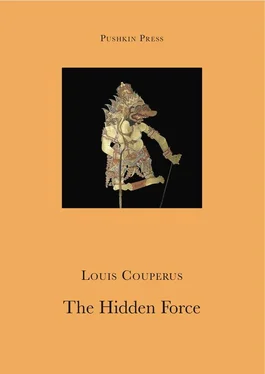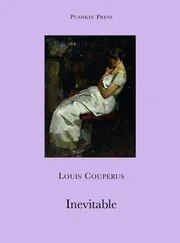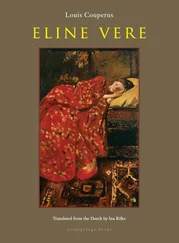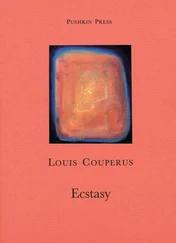Louis Couperus - The Hidden Force
Здесь есть возможность читать онлайн «Louis Couperus - The Hidden Force» весь текст электронной книги совершенно бесплатно (целиком полную версию без сокращений). В некоторых случаях можно слушать аудио, скачать через торрент в формате fb2 и присутствует краткое содержание. Год выпуска: 2012, ISBN: 2012, Издательство: Pushkin Press, Жанр: Классическая проза, на английском языке. Описание произведения, (предисловие) а так же отзывы посетителей доступны на портале библиотеки ЛибКат.
- Название:The Hidden Force
- Автор:
- Издательство:Pushkin Press
- Жанр:
- Год:2012
- ISBN:9781908968227
- Рейтинг книги:4 / 5. Голосов: 1
-
Избранное:Добавить в избранное
- Отзывы:
-
Ваша оценка:
- 80
- 1
- 2
- 3
- 4
- 5
The Hidden Force: краткое содержание, описание и аннотация
Предлагаем к чтению аннотацию, описание, краткое содержание или предисловие (зависит от того, что написал сам автор книги «The Hidden Force»). Если вы не нашли необходимую информацию о книге — напишите в комментариях, мы постараемся отыскать её.
The Hidden Force — читать онлайн бесплатно полную книгу (весь текст) целиком
Ниже представлен текст книги, разбитый по страницам. Система сохранения места последней прочитанной страницы, позволяет с удобством читать онлайн бесплатно книгу «The Hidden Force», без необходимости каждый раз заново искать на чём Вы остановились. Поставьте закладку, и сможете в любой момент перейти на страницу, на которой закончили чтение.
Интервал:
Закладка:
Louis Couperus
The Hidden Force
BOOK I
1
THE FULL MOON, which that evening had a tragic intensity, had risen early, just before twilight faded, like a huge, blood-red globe. It flared sunset-like low beyond the tamarind trees of Long Avenue and climbed, gradually purging itself of its tragic hue, into an indistinct sky. A deathly hush pervaded everything like a veil of silence, as if, after the long afternoon siesta, the evening’s rest were beginning without any transition. Over the town, its white-pillared detached houses hidden among the tree-lined avenues and gardens, there hung a muffled silence in the oppressiveness of the evening air, without a breath of wind, as if the lustreless evening were wearied by the scorching east monsoon day. The houses nestled silently amid the vegetation, with their regularly looming ranks of large whitewashed flowerpots. Here and there lights were already being lit. Suddenly a dog barked and another dog answered, tearing the muffled silence into long, coarse shreds; the angry dogs — hoarse, breathless, gruffly hostile — suddenly they too fell silent.
At the end of Long Avenue lay the district commissioner’s mansion, set deep behind its front garden. Straight out of the blackness of the giant banyan trees its low lines of tiled roofs zigzagged their way one after the other towards the shadow of the rear garden, casting a primitive outline over a patchwork of rooms and verandas to form a single silhouette. At the front, however, rose the white columns of the portico, dazzlingly bright and substantial, widely spaced, open and welcoming with the expansiveness of an imposing palace gate. Through the open doors the central gallery extended backwards, illuminated by an occasional flickering lamp.
A native attendant lit the lanterns at the side of the house. Semicircles of large white pots containing roses and chrysanthemums, palms and caladiums fanned out left and right in a wide arc from the front to the side of the house. A broad gravel path formed the drive up to the white-columned portico; there was a wide, arid expanse of lawn surrounded by pots, and in the middle of it, on a brick pedestal, was a monumental vase containing a large latania. A green freshness was provided by the winding pond, where the huge leaves of a Victoria regia rubbed shoulders like round, dark-green trays, with the occasional splash of white from a lotus-like flower among them. A path wound along the edge of the pond, and in a round shingle-covered area stood a tall flag pole. The flag had already been lowered, as it was every day at six. A simple gate divided the grounds from Long Avenue.
The huge compound was silent. A single lamp from the candelabra on the front veranda, and another inside turned down low, had now slowly begun to burn, having been laboriously lit by the lamp boy as two night lights in the palace of columns and receding roofs, its perspective like that of a child’s drawing. On the steps of the office sat several attendants in dark uniforms, talking in whispers. After a while one of them got up and, with the leisurely gait of one not wishing to hurry, headed towards a bronze bell hanging high up, near the attendants’ shed at the very edge of the compound. He reached the bell after a hundred paces and rang seven slowly echoing strokes. The clanger reverberated with a brazen note, each stroke followed by a zigzagging boom. The dogs’ barking began again. The attendant, supple and boyishly slim in his blue linen jacket and trousers with yellow facings, cuffs and collar, calmly retraced his hundred steps back to the other attendants.
The light had now been turned on in the office and in the adjoining bedroom, where a faint glow penetrated through the blinds. The District Commissioner, a large thick-set man in a black jacket and white trousers, walked through the office and called outside:
“Attendant!”
The head attendant, in his linen uniform jacket, its tails edged with a wide yellow hem, approached on bended knees and crouched down…
“Call the nyonya , your mistress!”
“The nyonya has gone out, kanjeng !” whispered the man, and with both hands, fingers touching, he made the respectful sign of the semba .
“Where has the mistress gone to?”
“I haven’t checked yet, master!” said the man, as an excuse for not knowing, and again made the sign of the semba .
The District Commissioner thought for a moment.
“My cap,” he said. “My cane.”
The head attendant, his knees still bent in dutiful respect, scuttled across the room and in a crouching position offered the semi-formal uniform cap and a walking stick.
The Commissioner went out, the head attendant hurrying after him holding a long burning wick, the glowing tip of which he swung in order to identify the Commissioner to anyone passing by in the dark. The Commissioner walked slowly across the compound and onto Long Avenue. Along that avenue, like a row of tamarind trees and flamboyants, were the villas of the principal local dignitaries, faintly lit, deathly quiet, seemingly unoccupied, with the lines of white-washed flowerpots glowing in the dim evening light.
The Commissioner walked first past the secretary’s house; then a girls’ school on the other side; then the notary’s office, a hotel, the post office and the home of the president of the criminal court. At the end of Long Avenue was the Catholic church, and farther on, across the river bridge, was the station. Outside the station was a large European shop, better illuminated than the others. The moon, having climbed higher and turning a brighter silver as it rose, shone down on the white bridge, the white shop, the white church: all this around a small, treeless square with a small, pointed monument — the municipal clock — at its centre.
The Commissioner met no one; the occasional Javanese, moving through the darkness, appeared momentarily from the shadows, causing the attendant to swing the glowing tip of his wick ostentatiously behind his master. Usually the Javanese understood and cowered to one side of the road. Sometimes, out of ignorance, fresh from his village, he failed to understand and walked anxiously by, looking apprehensively at the attendant, who kept on swinging and as he passed snapped a curse at him, because he — yokel as he was — had no manners. If a carriage or a trap approached, he again swung his shooting star through the evening, signalling to the coachman, who either stopped and alighted, or crouched in his vehicle, and while crouching steered towards the very edge of the road.
The Commissioner walked on gloomily, with a steady, determined pace. He turned right off the small square and walked past the Dutch Reformed Church, straight towards an attractive villa with slim, fairly accurate Ionic plaster columns and brightly lit with paraffin lamps set in a candelabra. It was the Concordia club. A few servants in short, tight-fitting white jackets were sitting on the steps. A European in a white suit, the landlord, was walking about the front veranda. But there was no one around the large drinks table and the broad wicker chairs spread their arms as if waiting in vain.
The landlord bowed on seeing the Commissioner, who touched his cap briefly, passed the club and turned left. He walked to the end of the avenue, past dark little cottages hidden away in small compounds, turned again and walked along the mouth of the river. Proa after proa lay moored there, like on a canal; a monotonous buzz of Maduran seamen droned slowly across the water, from which a fishy odour rose. Passing the harbourmaster’s office, the Commissioner continued towards the pier, which extended some way into the sea, and at the tip of which the iron candelabra shape of a small lighthouse, like a miniature Eiffel Tower, rose up. Here the District Commissioner stopped and breathed in deeply. The wind had suddenly got up, the east monsoon wind blowing from afar, as it did every day at that hour. But suddenly, unexpectedly, it stopped, subsided, as if flapping its wings in vain. The choppy sea smoothed its moon-white curls of foam and, momentarily, became a long, pale phosphorescent expanse.
Читать дальшеИнтервал:
Закладка:
Похожие книги на «The Hidden Force»
Представляем Вашему вниманию похожие книги на «The Hidden Force» списком для выбора. Мы отобрали схожую по названию и смыслу литературу в надежде предоставить читателям больше вариантов отыскать новые, интересные, ещё непрочитанные произведения.
Обсуждение, отзывы о книге «The Hidden Force» и просто собственные мнения читателей. Оставьте ваши комментарии, напишите, что Вы думаете о произведении, его смысле или главных героях. Укажите что конкретно понравилось, а что нет, и почему Вы так считаете.












